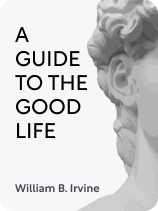

This article is an excerpt from the Shortform book guide to "A Guide to the Good Life" by William B. Irvine. Shortform has the world's best summaries and analyses of books you should be reading.
Like this article? Sign up for a free trial here.
What do you want out of life? What should you pursue—and how should you pursue it?
These days, many people chase after fame or fortune in an effort to find joy and peace. Philosophy professor William B. Irvine issues a warning for this way of thinking and recommends that Stoicism is a better path to true happiness.
Read more to learn about the benefits of Stoicism and see how this ancient philosophy can help you successfully navigate life.
The Benefits of Stoicism
Irvine argues that Stoicism is valuable because most people today don’t actually know what they want out of life. As a result, they pursue things that society says they should value (such as wealth, fame, success, and material possessions), assuming these things will make them happy. Irvine argues that external rewards like these can’t make you happy and that, if you spend your life pursuing them, you run the risk of regretting your choices later on. Moreover, Irvine points out that, even if you do know what you want out of life, you might not know how to get it. For example, you might want to care less about what other people think of you, but still find yourself craving popularity and approval.
(Shortform note: In The Subtle Art of Not Giving a F*ck, Mark Manson agrees that contemporary society pushes us to value the wrong things, and he adds that one of the problems is that we wrongly believe that we should be happy all the time. In fact, Manson argues, unhappiness is a normal and necessary part of life, and if we don’t accept that, we’ll make mistakes like always trying to feel good about ourselves (instead of accepting that we’ll fail sometimes) and trying to avoid struggle (instead of seeing it as path to growth).)
Irvine says that the benefits of Stoicism are revealed in the way that they answer both of these concerns. Stoicism tells you what to pursue—tranquility—and how you can achieve it. Irvine points out that many Stoic ideas and practices echo teachings from various spiritual traditions (particularly Buddhism, which Irvine considered practicing before he discovered Stoicism). He argues that, for contemporary readers who are leery of religion or who like to think analytically, Stoicism may be the ideal vehicle for learning these principles because it requires neither faith nor devotion, and it relies on practical, concrete advice.
(Shortform note: As Irvine suggests, a number of spiritual traditions have concepts analogous to Stoic tranquility. For example, Buddhism offers the meditation practice of shamatha—meaning “calm abiding” or “tranquility”—in which you accept your mind just the way it is. Moreover, in Buddhism, shamatha and other practices are designed to help you reach enlightenment, a state of peace in which you no longer suffer. Similarly, Christianity speaks of a “peace that surpasses all understanding”—a phrase generally interpreted to mean that, through prayer and faith, you’ll learn not to worry and to find comfort in any situation, although the original language suggests that it means that the peace God gives is superior to understanding.)

———End of Preview———
Like what you just read? Read the rest of the world's best book summary and analysis of William B. Irvine's "A Guide to the Good Life" at Shortform.
Here's what you'll find in our full A Guide to the Good Life summary:
- A simple step-by-step guide to developing a Stoic practice
- How to be happier, calmer, and more fulfilled in life
- How you can evaluate your Stoic progress daily






